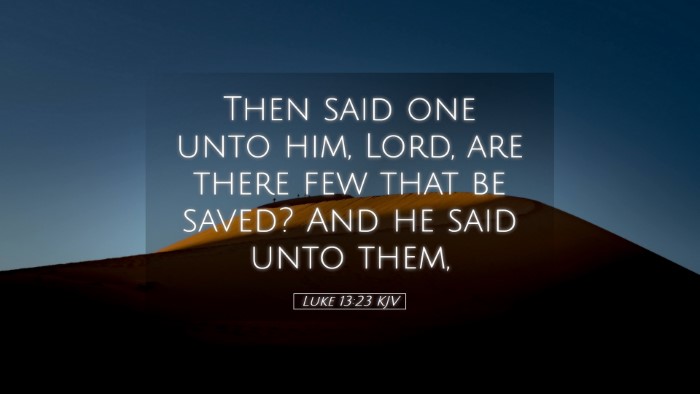Commentary on Luke 13:23
In Luke 13:23, the question arises from an inquirer concerning the number of those who will be saved:
"Lord, are there few that be saved?" This verse serves as a poignant reminder of the urgency of salvation and the solemn nature of faith and repentance in Christ.
Contextual Analysis
To understand this query, we must consider the context of Jesus’ ministry. Throughout the Gospels, He often addresses the themes of judgment, the Kingdom of God, and the inclusivity of the Gospel message. This particular inquiry embodies the concerns of many who were listening to Him at the time.
Insights from Commentators
Matthew Henry
Matthew Henry emphasizes the seriousness of Christ's teaching concerning salvation. He indicates that the question reflects a common concern among His listeners. Henry comments that the path to salvation is narrow, which explains the apprehension of the inquirer. He states:
“Christ's answer serves to awaken serious thought in all where it concerns their eternal state.”
Henry further notes that though the door is open for salvation, many neglect it, which leads to the tragic consequences of being shut out from God's grace.
Albert Barnes
Albert Barnes provides a detailed interpretation, highlighting the doctrinal implications of this verse. He notes:
“The question implies a fear that few would be saved, and Jesus’ response clarifies the reality of this concern.”
Barnes explains that the "narrow way" signifies the rigorous demands of discipleship. He urges the reader to recognize that entry into the Kingdom requires fervent effort and commitment. Barnes encourages believers to seek a deeper understanding of their spiritual journey and live in accordance with the teachings of Christ.
Adam Clarke
Adam Clarke approaches this passage with a focus on the implications for the modern believer. He remarks on the cultural understandings of salvation in Jesus' time, indicating that:
“The question of who will be saved is timeless and relevant, echoing through generations.”
Clarke elucidates that while many may claim to follow Christ, the reality of true discipleship is measured by obedience. He admonishes that salvation is a gift, but it requires a readiness to forsake all for the sake of the Gospel.
Theological Implications
The theological significance of Luke 13:23 encompasses several critical aspects:
-
Narrowness of the Way:
The concept of the narrow gate presents the idea that while salvation is universally offered, it is not universally accepted. Matthew 7:13-14 reinforces this notion, indicating that the majority may choose to follow the broad path leading to destruction.
-
Urgency of Salvation:
The question asked reflects an urgency that is echoed throughout the New Testament. The call to seek the Lord while He may be found (Isaiah 55:6) resonates here, calling individuals to respond to the Gospel without delay.
-
Repentance and Faith:
This passage stresses the necessity of repentance as a precursor to entering the Kingdom of God. The faithful must engage in self-examination and humility before pursuing a right relationship with God.
Pastoral Applications
This verse speaks profoundly to the pastoral ministry. Here are some applications for pastors:
-
Encouragement to Evangelize:
Understanding that the road is narrow should fuel a passion for evangelism. Pastors are charged to proclaim salvation boldly, urging congregants to engage their communities with the Good News.
-
Discipleship Focus:
This passage challenges pastors to prioritize discipleship within their communities. Teaching congregations about the cost of discipleship can help them navigate the narrow path more effectively.
-
Fostering a Culture of Repentance:
Pursuing holiness means cultivating an atmosphere where confession, accountability, and repentance are encouraged, ensuring that the way remains open for those seeking salvation.
Concluding Thoughts
In conclusion, Luke 13:23 raises important questions about the nature of salvation and the heart of man towards God's calling. From the insights of esteemed commentaries, it is evident that careful attention to one’s walk with Jesus is paramount. Pastors, students, and scholars alike are reminded of the narrow path and the overwhelming grace available for those who earnestly seek Him.


